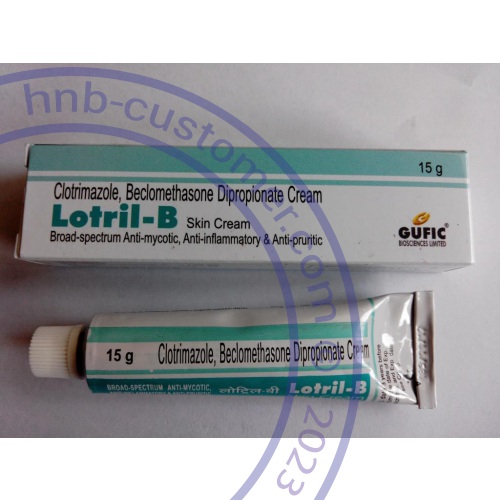Lotrisone
Betamethasone + Clotrimazole
Betamethasone and Clotrimazole cream
What is this medicine?
Betamethasone and Clotrimazole cream contains a combination of betamethasone and clotrimazol. Betamethasone is steroid that reduces itching, swelling, and redness of the skin. Clotrimazole is an antifungal medication that fights infections caused by fungus.
Betamethasone and Clotrimazole cream is used to treat fungal skin infections such as athlete's foot, jock itch, and ringworm.
Betamethasone and Clotrimazole may also be used for purposes not listed in this medication guide.
What should I tell my health care provider before I take this medicine?
You should not use Betamethasone and Clotrimazole cream if you are allergic to betamethasone or clotrimazole.
To make sure Betamethasone and Clotrimazole is safe for you, tell your doctor if you have:
-
any type of skin infection.
FDA pregnancy category C. It is not known whether Betamethasone and Clotrimazole will harm an unborn baby. Tell your doctor if you are pregnant or plan to become pregnant while using this medicine.
It is not known whether betamethasone and clotrimazole passes into breast milk or if it could harm a nursing baby. Tell your doctor if you are breast-feeding a baby.
Do not use Betamethasone and Clotrimazole cream on a child younger than 17 years old. Children are more likely to absorb the steroid through the skin. Do not use Betamethasone and Clotrimazole to treat diaper rash.
How should I use this medicine?
Use Betamethasone and Clotrimazole cream exactly as it was prescribed for you. Follow all directions on your prescription label. Do not use this medicine in larger or smaller amounts or for longer than recommended.
Do not take by mouth. Betamethasone and Clotrimazole cream is for use only on the skin. Do not use this medicine on open wounds or on sunburned, windburned, dry, chapped, or irritated skin. If this medicine gets in your eyes, nose, mouth, rectum, or vagina, rinse with water.
Betamethasone and Clotrimazole cream comes with patient instructions for safe and effective use. Follow these directions carefully. Ask your doctor or pharmacist if you have any questions.
Wash your hands before and after applying this medicine.
Apply a thin layer of cream and rub it in completely.
Do not cover treated skin areas with a bandage or tight clothing, unless your doctor has told you to.
After applying Betamethasone and Clotrimazole cream, allow your skin to dry completely before dressing. Wear loose-fitting clothing while you are treating jock itch. If you are treating athlete's foot, wear clean cotton socks and keep your feet as dry as possible.
Do not use Betamethasone and Clotrimazole cream for longer than 2 weeks for jock itch or 4 weeks for athlete's foot, unless your doctor has told you to.
It may take up to 1 or 2 weeks of using Betamethasone and Clotrimazole before your symptoms improve. For best results, use medicine for the full prescribed length of time. Your symptoms may improve before the infection is completely cleared. Skipping doses may also increase your risk of further infection that is resistant to antibiotics.
Call your doctor if your groin symptoms do not improve after 1 week, or if your foot symptoms do not improve after 2 weeks of treatment.
Store Betamethasone and Clotrimazole at room temperature away from moisture and heat. Keep the tube or bottle capped and tightly closed when not in use.
What if I miss a dose?
Apply the missed dose as soon as you remember. Skip the missed dose if it is almost time for your next dose. Do not use extra medicine to make up the missed dose.
What happens if I overdose?
An overdose of Betamethasone and Clotrimazole is not expected to be dangerous. Seek emergency medical attention.
What should I watch for while using this medicine?
Avoid getting this medicine in your eyes, mouth, and nose, or on your lips. If it does get into any of these areas, wash with water. Do not use Betamethasone and Clotrimazole cream on sunburned, windburned, dry, chapped, irritated, or broken skin.
Avoid wearing tight-fitting clothing that doesn't allow air circulation. Until the infection is healed, wear clothing that is made of natural fibers such as cotton.
What side effects may I notice from this medicine?
Get emergency medical help if you have any of these signs of an allergic reaction to Betamethasone and Clotrimazole: hives; difficulty breathing; swelling of your face, lips, tongue, or throat.
Topical steroid medicine can be absorbed through the skin, which may affect your adrenal gland. Call your doctor if you have:
-
nausea, vomiting, severe dizziness;
-
muscle weakness;
-
depressed mood, feeling irritable;
-
weight loss; or
-
tired feeling.
Common Betamethasone and Clotrimazole side effects may include:
-
burning or tingling of treated skin;
-
rash; or
-
swelling.
This is not a complete list of side effects and others may occur.
What may interact with this medicine?
It is not likely that other drugs you take orally or inject will have an effect on topically applied betamethasone and clotrimazole. But many drugs can interact with each other. Tell each of your health care providers about all medicines you use, including prescription and over-the-counter medicines, vitamins, and herbal products.













